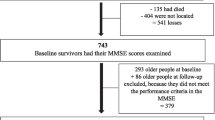Abstract
Objectives: To determine the relationship between functional status and health problems, age and co-morbidity in primary care patients. Methods: Patients from 60 general practitioners who visited their general practitioner were recruited and asked to complete a written questionnaire, including a list of 25 health problems and the SF-36 to measure functional status. The response rate was 67% (n = 4112). Differences between subgroups were tested with p < 0.01. Results: Poorer functional status which was associated with increased age (except for vitality) and increased co-morbidity. Patients with asthma/bronchitis/COPD, severe heart disease/infarction, chronic backpain, arthrosis of knees, hips or hands, or an ‘other disease’ had poorer scores on at least five dimensions of functional status. Patients with hypertension, diabetes mellitus or cancer did not differ from patients without these conditions on more than one dimension of functional status. In the multiple regression analysis age, had a negative effect on functional status (standardised β-coefficients between −0.03 and −0.34) except for vitality. Co-morbidity had a negative effect on physical role constraints (−0.15) and bodily pain (−0.09). All health problems had effects on dimensions of functional status (coefficients between −0.04 and −0.13). General health and physical dimensions of functional status were better predicted by health problems, age and co-morbidity (between 6.4 and 16.5% of variation explained) than mental dimensions of functional status (between 1.1 and 3.2%). Conclusion: Higher age was a predictor of poorer functional status, but there was little evidence for an independent effect of co-morbidity on functional status. Health problems had differential impact on functional status among primary care patients.
Similar content being viewed by others
References
Khaw KT. How many, how old, how soon? Br Med J 1999; 319: 1350-1352.
Smith KW, Avis NE, Assman SF. Distinguishing between quality of life and health status in quality of life research: A meta-analysis. Qual Life Res 1999; 8: 447-459.
Schlenk EA, Erlen JA, Dunbar-Jacob J, et al. Health-related quality of life in chronic disorders: A comparison across studies using the MOS SF-36. Qual Life Res 1998; 7: 57-65.
McHorney C, Ware JE, Raczek AE. The MOS 36-item Short-Form Health Survey (SF-36): II Psychometric and clinical tests of validity in measuring physical and mental health constructs. Med Care 1993; 31: 247-263.
Van der Zee KI, Sanderman R, Heyink J. A comparison of two multidimensional measures of health status: The Nottingham Health Profile and the Rand SF-36-item health survey 1.0. Qual Life Res 1996; 5: 165-174.
Mozes B, Maor Y, Shmueli A. The competing effects of discase states on quality of life of the elderly. Qual Life Res 1999; 8: 93-99.
Lumme-Sandt K, Hervonen A, Jylha M. Interpretative repertoires of medication among the oldest-old. Soc Sci Med 2000; 50: 1843-1850.
Sprangers MAG, Schwartz CE. Integrating response shift into health-related quality of life research: A theoretical model. Soc Sci Med 1999; 48: 1507-1515.
Daltroy LH, Larson MG, Eaton HM, Phillips CB, Liang MH. Discrepancies between self-reported and observed physical function in the elderly: The influence of response shift and other factors. Soc Sci Med 1999; 48: 1549-1561.
Singer MA, Hopman WM, MacKenzie TA. Physical functioning and mental healt in patients with chronic medical conditions. Qual Life Res 1999; 8: 687-691.
Greimel ER, Padilla GV, Grant MM. Physical and psychosocial outcomes in cancer patients: A comparison of different age groups. Br J Cancer 1997; 76: 251-255.
Kempen GIJM, Ormel J, Brilman EI, Relyveld J. Adaptive responses among Dutch elderly: The impact of eight chronic medical conditions on health-related quality of life. Am J Public Health 1997; 87: 38-44.
Van der Zee K, Sanderman R, Heyink J. De psychometrische kwaliteiten van de MOS 35-item Short Form Health Survey (SF-36) in een Nederlandse populatie. T Soc Gezondheidsz 1993; 71: 183-191.
Ware JE, Kosinksi M, Keller SD. SF-36 Physical and Mental Health Summary Scales: A Users' Manual. The Health Institute, New England Medical Center, Boston, MA. USA, December 1994.
Mootz M, Van den Berg J. Indicatoren voor gezondheidsenquête in de CBS-Gezondheidsenquête. [Health Indicators in the CBS Health Interview Survey]. Maandbericht Gezondheid (CBS) 1989; 2: 4-10.
Brazier JE, Harper R, Jones NMB, et al. Validating the SF-36 health survey questionnaire: new outcome measure for primary care. Br Med J 1992; 305: 160-164.
Paterson C. Measuring outcomes in primary care: a patient generated measure, MYMPO, compared with the SF-36 health survey. Br Med J 1996; 312: 1016-1020.
Lin M, Ward JE. Reliability of the MOS SF36 health status measure in Australian general practice. Aust Fam Physician 1998; 27: S94-S98.
Ruta DA, Abdalla MI, Garratt AM, Coutts A, Russell IT. SF 36 health survey questionnaire: I. Reliability in two patient based studies. Qual Health Care 1994; 3: 180-185.
Brazier JE, Walters SJ, Nicholl JP, Kohler B. Using the SF-36 and Euroqul on an elderly population. Qual Life Res 1996; 5: 195-204.
Carver DJ, Chapman CA, Thomas VS, Stadnyk KJ, Rockwood K. Validity and reliability of the medical outcomes study short form-20 questionnaire as a measure of quality of life in elderly people living at home. Age and Ageing 1999; 28: 169-174.
Standnyck K, Calder J, Rockwood K. Testing the measurement properties of the short form-36 Health Survey in a frail elderly population. J Clin Epidemiol 1998; 51: 827-835.
Harlow SD, Linet MS. Agreement between questionnaire data and medical records. The evidence for accuracy of recall. Am J Epidemiol 1989; 129: 233-248.
Author information
Authors and Affiliations
Rights and permissions
About this article
Cite this article
Wensing, M., Vingerhoets, E. & Grol, R. Functional status, health problems, age and comorbidity in primary care patients. Qual Life Res 10, 141–148 (2001). https://doi.org/10.1023/A:1016705615207
Issue Date:
DOI: https://doi.org/10.1023/A:1016705615207




